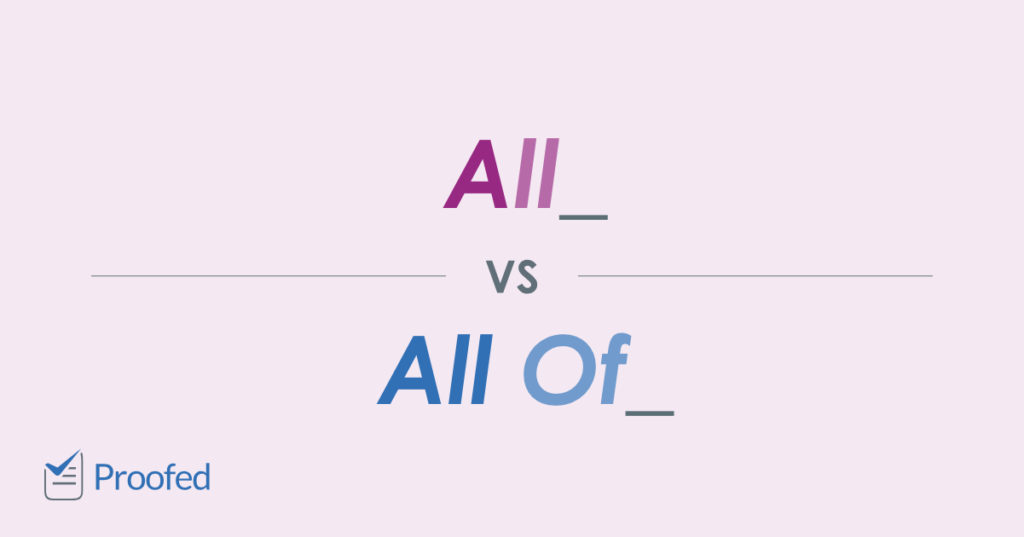Here, we’re looking at when to use “all of” rather than “all” by itself. Make sure you can avoid errors when using these terms by checking out our guide below.
When to Use “All Of”
The sense of “all” that applies here is its use as a determiner (or a predeterminer). This means using “all” to indicate how much of something we’re discussing. For example, “all students” means “every single student,” not just some of them.
As a rule of thumb, we use “all of” when “all” is a determiner and the next word in the sentence is a pronoun. When this is a personal pronoun (e.g., me, you, us, them) or a relative pronoun (e.g., whom, which), we need the “of” to make the sentence grammatical. For example:
When “all” precedes another determiner as part of a noun phrase, though, the “of” is typically optional. This includes the definite article (i.e., the):
Demonstrative determiners (e.g., this, that, these, those):
And possessive adjectives (e.g., my, his, her, your, our, their). For instance:
Some style guides recommend leaving out “of” when it is optional. This will make a sentence more concise, but it is ultimately up to you.
When to Use “All” By Itself
So when do we need to use “all” by itself? As mentioned, you can do this when the next word is a pronoun or determiner. But there are situations when adding the “of” is not an option. These are:
- When “all” comes before a noun referring to an entire class of things.
- When “all” is used before an uncountable noun without a determiner (i.e., a noun with no plural form without a word like “the” or “my” in front).
In the case of an plural noun that refers to an entire class, we would write:
Find this useful?
Subscribe to our newsletter and get writing tips from our editors straight to your inbox.
Here, we use “all” without “of” because “cats” refers to every possible feline, not a specific group of cats. And we would do the same if “all” came before an uncountable noun:
In both cases, the “of” is not just unnecessary; it is grammatically incorrect.
“All” as a Pronoun
We mentioned above that “all” is always followed by “of” when the next word is a personal or relative pronoun. This only applies when “all” is a determiner.
You will also see “all” used as a pronoun meaning “everyone,” “everything,” or “the only thing.” And when “all” is a pronoun, it can be combined with other pronouns without using “of”:
These sentences are both fine as “all” is used as a pronoun, not a determiner.
Summary: All or All Of?
When deciding whether to write “all” or “all of,” keep the following in mind:
- Use all of when the next word is a personal or relative pronoun.
- You can use either all or all of when the next word in the sentence is a noun phrase that begins with a determiner.
- Use all by itself when the next word in the sentence is a plural noun that refers to an entire class of things or an uncountable noun.
And don’t forget to have your writing proofread for free! We will check your writing for errors, and we can even offer feedback on grammar and other issues.
